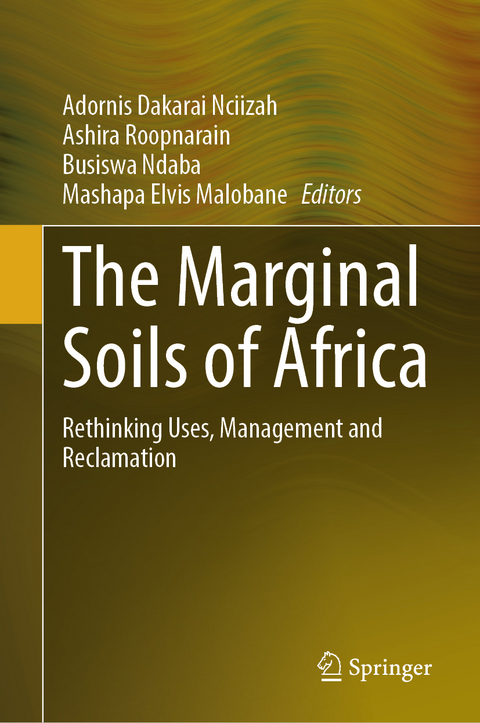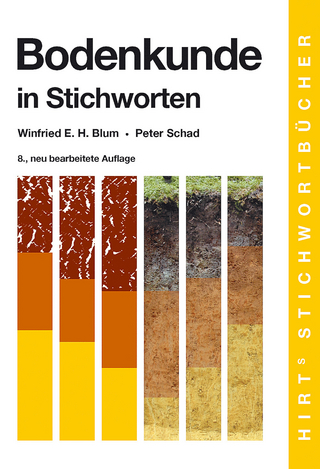
The Marginal Soils of Africa
Springer International Publishing (Verlag)
978-3-031-55184-0 (ISBN)
Adornis Dakarai Nciizah holds a PhD in Crop Science. His current research work focuses on, soil surface structural conditions and properties affecting early crop growth, climate-smart agriculture, sustainable bio-energy feedstock production on marginal soils, and sustainable agricultural production in smallholder farming areas. He has authored numerous scientific papers and reviews on agronomy and soil science and supervised several postgraduate students.
Ashira Roopnarain holds a PhD in Microbiology and Biotechnology. Her current research focus includes renewable energy generation from organic waste streams, adoption of nanotechnology for improved energy production and agricultural optimisation, precision agriculture and contaminants of emerging concern in waterways. She has authored several scientific articles and book chapters and has supervised both MSc and PhD students.
Busiswa Ndaba holds a PhD in Chemical Engineering. Her current research is on the formulation of nanomaterials that can be futher used as nanofertilizers for crop production as well as optimization of biofuel production using both microbial and nanotechnology techniques. She has published her work in the form of articles and book chapters and has been invited as a reviewer for several publications. She also has postgraduate students (MSc and PhD) under her tutelage.
Mashapa Elvis Malobane holds Ph.D. Agric. in soil science. His area of research interest includes agronomy, rehabilitation of marginal lands, application of X-ray computed tomography in soil physics, sustainable production of bioenergy crops, climate change mitigation and adaptation, and environmental soil science. He has authored numerous scientific papers, book chapters, examined several postgraduate theses and supervised a number of postgraduate students.
Part I: Uses Of Marginal Lands.- Utilization And Improvement Of Marginal Soils Through Large Stock Grazing In Semi-Arid Summer Rainfall Areas In South Africa .- Optimizing Sweet Sorghum Production In Marginal Lands Through Conservation Agriculture: A Case Study From Eastern Cape, South Africa.- Animal Feed Production And Its Contribution To Sustainability Of Livestock Systems: African Perspective.-Replenishing Marginal Soils Through Use Of Agroforestry Systems In Southern Africa: A Case Study Of Pigeonpea (Cajanus Cajan L. Millsp) Improved Fallows In South Africa.- Climate Change Resilient Crops To Combat Food And Nutrition Insecurity In Marginal Lands.- Part II: Reclamation And Management If Marginal Soils.- Strengthening Crop Production In South African Marginal Land Through Conservation Agriculture:Experiences From Local Research.- Increasing Productivity Through Enhanced Water Use Efficiency In Marginal Soils.- Promoting Low-Input Agricultural Practices To Improve Marginal Lands For Sustainable Crop Production And Food Security In Sub-Saharana African Countries.- Revitalization Of Degraded Soils In The Communal Areas Of Zimbabwe.- Part III: Future Strategies.- Exploring Biotechnological Strategies In The Monitoring Of Soil Quality.- The Use Of Nanofertilizers As Micronutrients To Improve Marginal Soils And Crop Production.- Role Of Targeted Breeding To Improve Wheat Production On The Marginal Lands Of Africa.- Enhancing Above And Below-Soil Arthropods: A Way To Enhance Production On Marginal Lands.- Enhancement To Soil Arbuscular Mycorrhizal Fungi: A Step Towards Restoring Marginal Soils.- Sustainable Soilless Recovery Hydroponics For Productive Use Of Marginal Lands: A South African Context.- The Potential Of Black Soldier Fly Frass To Revitalize Marginal Soils.- Vermicomposting For Improved Soil Health: Prospects For Degraded Soils.- Reclamation Technologies For Marginal Soils In Africa: Strategies, Challenges, And Future Directions.- Rainwater Harvesting Technologies And Soil Moisture Conservation In Marginalised Semi-Arid Soils Of Southern Africa.
| Erscheinungsdatum | 27.04.2024 |
|---|---|
| Zusatzinfo | XII, 375 p. 40 illus., 38 illus. in color. |
| Verlagsort | Cham |
| Sprache | englisch |
| Maße | 155 x 235 mm |
| Themenwelt | Naturwissenschaften ► Geowissenschaften ► Geologie |
| Weitere Fachgebiete ► Land- / Forstwirtschaft / Fischerei | |
| Schlagworte | climate change • Climate change resilient crops • Degraded Soils • land restoration • Marginal land • Nano fertilizers • nanotechnology • Rehabilitation • Sub-Saharan Africa • Underutilised crops • unproductive land |
| ISBN-10 | 3-031-55184-2 / 3031551842 |
| ISBN-13 | 978-3-031-55184-0 / 9783031551840 |
| Zustand | Neuware |
| Haben Sie eine Frage zum Produkt? |
aus dem Bereich


